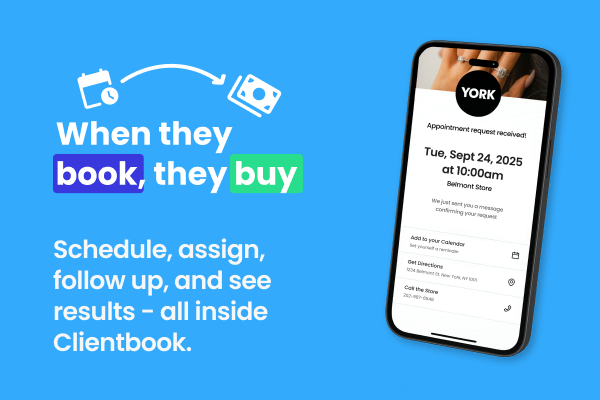As a small retail business with only a handful of clients to keep track of, it's not too difficult to keep a mental note of your clients' names, product preferences, and birthdays. You might be able to get away with taking a few notes here and there on an as-needed basis, but it's likely you don't have much of a formal client management process in place.
However, as your business grows—and the number of regular clients you have coming in grows with it—remembering all of those dates and names on your own suddenly becomes a complex task for you and your sales team.
That's why many retailers create client lists with important aspects of client information written down so they don't have to remember it all on their own.
If you've never used a client information sheet before, this article will serve as a beginner's guide, filling you in on what they are, what information they should include, and offer an alternative solution to make the task of client management even easier.
What is a client information sheet?
Client information sheets, also known as customer information sheets, are documents storing basic client information and contact details so you and your sales associates can refer back to them as needed.
This could be done by having buyers fill out a client information form themselves when they come into your store, or by having your sales associate complete one off of a basic client information template used for each of your key customers.
The point of having client sheets like these is to help maintain a strong relationship between clients and a business. (And avoid back-and-forth emails to ask for information from a client you already asked for once!)
This practice in retail of relationship building with clients is also known as clienteling. It's a proven way to increase customer retention, personalize the shopping experience for your buyers, and build loyalty over time.
What information should be included on a client record?
The information you keep track of on your client profiles will vary slightly depending on your industry. For example, if you own a furniture store, noting information about a customer's home, how many rooms they have, and any renovations they have coming up would be important for your sales team to keep track of.
On the other hand, if you're a jeweler, noting a client's relationship status and upcoming anniversaries are more important for the kind of purchases your clients will be making.
Generally speaking, a client profile should include anything you would need to know about a client so that you could reach out to them in the future and understand what motivates them to make a purchase. The more information you have, the personalized the communication with your clients can be!
Below are a few common examples of information business entities usually keep on their client database:
- Client contact details (home address, email address, phone number)
- Client's preferred communication channels and contact time
- Credit card or other payment information
- Marital status or other important client relationships
- Product preferences and interests
- Past shopping history
- Upcoming appointment times
Why is it important to record client information?
If you've never dedicated much time or effort into keeping track of client information, there are a lot of advantages to having a formal process in place. Below we'll go over just a few reasons why it's important to have an accurate client information list as a retailer.
Ensures knowledge isn't lost when a sales associates leaves
Perhaps the most basic reason keeping up-to-date client information sheets is important is to make sure you can always reach out to your clients, especially if one of your sales associates ever leaves employment with you.
Keep good record of basic client details that are available to everyone who works at your store ensures that no one store associate is housing information about a client on a personal device that could get lost when they leave. That way you'll still have access to client details you need to maintain that business relationship.
Allows you to personalize each client's shopping experience
Next, taking detailed notes about each of your clients allows you and your sales team to tailor their shopping experience to what you know they will appreciate most.
For example, if you have information about a client's birthday and product preferences on their client sheet, you can email them during their birthday month with a personalized offer for a product that's similar to something they've purchased in the past.
By personalizing the client experience, you're not only increasing satisfaction for your buyer, but you're also going to increase your sales at the same time. An Epsilon survey found that 80% of consumers are more likely to make a purchase when brands offer personalized experiences.
Increases client loyalty and retention
Finally, comprehensive client lists make it easier to build and maintain strong relationships with your clients, increasing the likelihood that they'll come back to your store time and time again.
Better yet, the more satisfied your current clients are, the more likely they are to tell their friends and family about their positive experiences with you. They'll then introduce your store to more prospective clients, further growing your business.
How to upgrade your client information sheet template
Most retailers look to a client information sheet template to make the job of client management easier. However, a template still requires manual note taking, which becomes increasingly time consuming as your client base grows.
Having a digital client data repository—especially one that allows you to sort, organize, and filter your clients—is a game-changer for retailers looking to upgrade from a basic client list.
With clienteling software like Clientbook, your sales associates can access all of the data they need from one client portal, get client reminders on when to reach out, send product recommendations to current customers, and so much more.
Conclusion
Keeping track of all your clients' information can get crazy as your business grows, but it doesn't have to be. With Clientbook's clienteling software, your sales team can go from taking manual notes and filling out basic clients lists on a daily basis to a seamless, digital process.
If you're ready to upgrade how your sales team manages client information, schedule a personalized demo today to see how Clientbook can transform how you do business.





